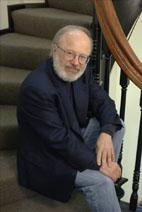Don't Alter Standard of Care in Health Crises, Annas Argues
Almost immediately after last January’s deadly earthquake in Haiti, physician volunteers began pouring into that country to offer help — with no promise of immunity from liability.

That’s one example cited by BUSPH Professor George Annas, chair of health law, bioethics and human rights, in a newly published article in The New England Journal of Medicine in which he argues against the need for a new medical “standard of care” in national crises or emergencies.
“The movement supporting altered standards of care has been based on three false premises,” Annas writes, “first, that there is a difference between the legal standard of medical care and the medical standard of care; second, that during an emergency, physicians are unlikely to respond because they are worried about liability if they do not practice medicine the same way they would in their hospitals or offices under nonemergency conditions; and third, that each state should have its own laws about altered standards of care in emergencies…
“Emergencies do not alter competence to treat patients,” Annas says. “Most important, emergencies do not alter the medical standard of care, which can be understood simply as doing what you can under the circumstances, with the patient’s informed consent. The standard of care is the same in sickness and in health and in emergencies.”
Annas discusses — and dismisses as unnecessary — repeated proposals to redefine the standard of care, and expand legal immunity for volunteers, in cases of mass casualties. He says that the notion that individual states should adopt emergency standards of care is a mistake, given that major disasters, such as Hurricane Katrina, cannot be dealt with by a single state.
“Disasters that require physician volunteers from other states are always incidents of national significance that require the intervention of the federal government,” he writes.
He also argues that there is no “empirical evidence” to suggest that liability concerns have ever led to a shortage of physicians responding to emergencies.
“Physicians have consistently put medical ethics ahead of anxiety about liability in this context,” he says.
Annas’ entire article is available on the NEJM website.
Submitted by Lisa Chedekel